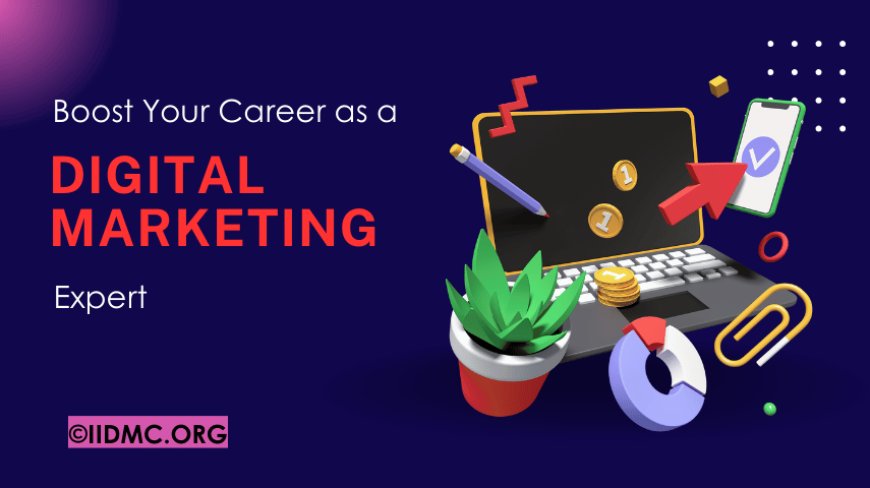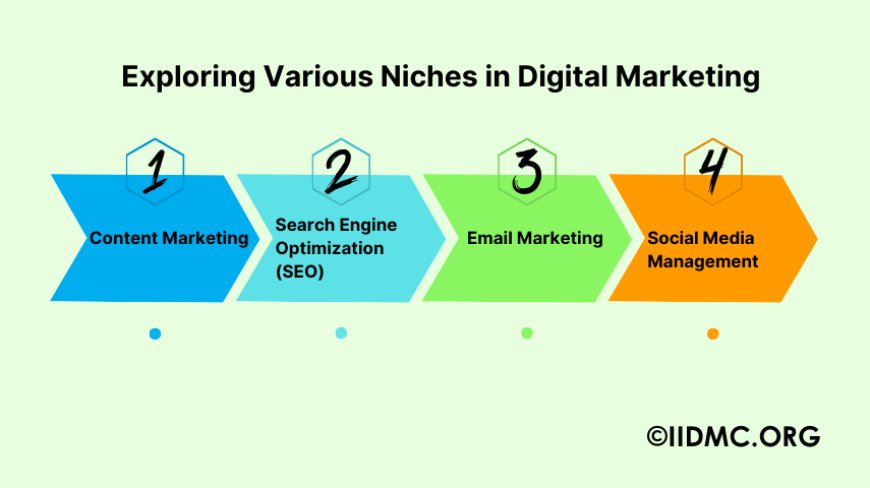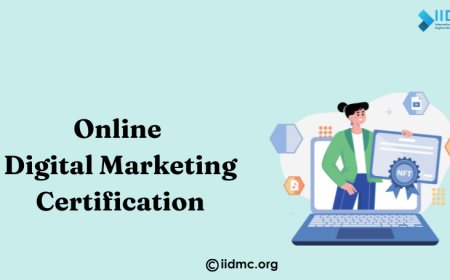Boost Your Career as a Digital Marketing Expert
Boost your career with expert digital marketing skills! Master SEO, social media, PPC, and more to become a sought-after digital marketing professional. Start today!

In the competitive field of digital marketing, standing out requires more than just creativity it demands a mix of skills, strategy, and staying informed about what truly works. Whether you're just starting your career or looking to take it to the next level, becoming a marketing expert involves learning how to connect with people, use the right tools, and deliver results that make an impact.This blog will guide you through practical steps and ideas to help you grow in this field. From understanding your audience to using data smartly, we'll break down complex ideas into simple, actionable tips. If you're ready to build your knowledge and turn your passion for marketing into real opportunities, you're in the right place. Let's dive in.
Understanding the Changing World of Marketing
Marketing has come a long way from newspaper ads and billboards. The focus has shifted to reaching people through online platforms, social media, and other digital tools. Traditional methods like TV and print are still around, but more businesses are now prioritizing online marketing because it’s easier to reach specific audiences and measure results.
Key Trends Shaping Modern Marketing
-
Personalization: Have you ever noticed how ads on your social media or shopping websites seem tailored just for you? That’s personalization. Businesses now use customer data to show products and services that match your preferences, making their marketing more effective.
-
Data-Driven Strategies: Companies collect a lot of information about what people like, how they shop, and even the times they’re most likely to buy something. By analyzing this data, they can create campaigns that work better and spend less money guessing what will work.
-
AI and Automation: Artificial Intelligence (AI) is helping marketers save time and improve results. For example, chatbots can answer customer questions instantly, and email tools can send messages to the right people at the right time. This makes marketing more efficient.
Understanding Consumer Behavior
At the core of every successful marketing strategy is understanding how people think and act. For example, why do people prefer one brand over another? What makes them choose to click on an ad or skip it? Marketers spend a lot of time studying these behaviors so they can create campaigns that truly connect with their audience.
By learning about these trends and consumer habits, you’ll gain insights into how marketing works in real-world scenarios. It’s not just about selling something—it’s about building trust and creating meaningful connections with your audience.
Building a Strong Foundation in Marketing
If you want to grow as a marketing professional, it’s important to start with the right knowledge, skills, and tools. This foundation will help you create effective campaigns and solve problems creatively while staying organized and focused on results.
Education and Certifications
You don’t necessarily need a fancy degree to begin your marketing journey, but having a formal education in marketing, business, or communication can help you understand the basics. If going back to school isn’t an option, there are plenty of online courses that teach you the skills you need.
Specialized certifications like Google Ads valuable. These programs are affordable, flexible, and widely respected in the industry. They help you gain expertise in specific areas and make your resume stand out.
Essential Skills for Marketing Experts
-
Creativity: Marketing is all about grabbing attention. Whether it’s writing catchy ad copy, designing an engaging social media post, or coming up with a new idea for a campaign, thinking outside the box is a must.
-
Analytical Thinking: Understanding numbers is as important as being creative. Analyzing data helps you know what’s working and what’s not, so you can make informed decisions.
-
Communication: Whether you’re presenting an idea to a team, writing an email, or creating an ad, clear communication is key. You’ll need to connect with your audience and make your message simple and relatable.
Recommended Tools and Software to Master
Knowing how to use the right tools can save you time and help you work smarter. Here are some that every aspiring marketer should explore:
-
Google Analytics: Helps you track and understand website traffic and user behavior.
-
Customer Relationship Management (CRM) Platforms: Tools like HubSpot or Salesforce organize customer data, making it easier to manage relationships and target your audience effectively.
-
Social Media Tools: Platforms like Hootsuite or Buffer make it easier to schedule posts, track performance, and manage multiple accounts.
By focusing on building these skills and learning these tools, you’ll be better prepared to create campaigns that work and stand out in the marketing field. Whether you’re just starting out or leveling up, these steps will set you on the right path.
Developing Your Niche in Marketing
The field of marketing is huge, with so many areas to explore. To stand out and build a rewarding career, it helps to focus on a specific area that matches your interests and strengths. Finding your niche lets you become an expert in one area, making you more valuable to employers or clients.
Exploring Various Niches in Digital Marketing

Marketing has something for everyone, depending on what you enjoy and what skills you want to develop. Here are some popular niches:
-
Content Marketing: If you love writing, storytelling, or creating videos, content marketing might be for you. It’s all about producing content that educates, entertains, or inspires your audience.
-
Search Engine Optimization (SEO): SEO is about helping websites rank higher on search engines like Google. If you enjoy analyzing data and understanding how people search online, this could be a great fit.
-
Email Marketing: Emails are still one of the most effective ways to communicate with customers. If you’re good at writing persuasive messages and like testing strategies to see what works, this niche is worth exploring.
-
Social Media Management: For those who love staying active on platforms like Instagram, TikTok, or LinkedIn, managing social media accounts and growing an audience might be the way to go.
How to Identify the Right Niche for You
To figure out your niche, start by asking yourself these questions:
-
What am I naturally good at? For example, if you’re a strong communicator, content marketing or social media could be ideal.
-
What do I enjoy doing? If analyzing trends and solving puzzles excites you, SEO might be your thing.
-
Where do I see myself growing? Think about which niche aligns with your long-term goals.
It’s okay to try different areas before settling on one. Internships, freelance projects, or online courses can help you explore your options.
Why Specialization Matters
Specializing in one niche helps you become an expert, which can open up more opportunities and even lead to higher earnings. For example, instead of being a general marketer, being known as an "SEO Specialist" or a "Social Media Strategist" makes you more attractive to potential employers or clients. It also helps you focus your learning, allowing you to go deeper into the skills and tools that matter most in your chosen area.
By finding the niche that fits you best, you’ll be able to do work that you enjoy, build your expertise, and grow your career in a meaningful way.
Expanding Your Knowledge and Staying Updated
Marketing is constantly changing, so continuous learning is essential. Staying updated helps you adapt to new tools, strategies, and customer behaviors.
Where to Learn:
-
Blogs: Neil Patel, Moz.
-
Podcasts: “Marketing School,” “GaryVee Audio Experience.”
-
Communities: Reddit’s r/marketing, LinkedIn Groups.
-
Events: Webinars, conferences.
Use Market Research:
Tools like Google Trends or competitor analysis can help you stay on top of trends and understand customer preferences.
Building a Personal Brand
A strong personal brand highlights your expertise and attracts opportunities.
Online Presence:
Create a LinkedIn profile, start a blog, or use professional social media to share insights.
Show Your Expertise:
Post tips, write articles, or create videos to establish yourself as a thought leader in your niche.
Networking Tips:
Attend events, engage in discussions, and connect with professionals on platforms like LinkedIn. Focus on building genuine relationships, not just asking for favors.
By staying informed and showcasing your skills, you can grow your career and stand out in the marketing industry.
Gaining Practical Experience
Practical experience is key to building confidence and learning how marketing works in real life. Here’s how to get started:
-
Internships and Freelancing: Internships give you hands-on experience, while freelancing lets you explore different projects. Even volunteering for nonprofits can help you build your portfolio.
-
Diverse Projects: Working on various tasks—like social media management, ad campaigns, or content creation—helps you discover what you enjoy and improves your skills.
-
Learning from Failures: Not every campaign will succeed, but failures can teach you valuable lessons. Analyze what went wrong and use that knowledge to improve your next project.
Leveraging Technology and Data
In marketing, data and technology are powerful tools for making informed decisions and achieving better results.
-
Role of Data Analytics: Understanding customer behavior through tools like Google Analytics or CRM software helps you create strategies that work.
-
Marketing Automation: Platforms like Mailchimp or HubSpot save time by automating tasks like email campaigns or social media posting.
-
Success Stories: Companies using data-driven strategies often see better results. For example, analyzing customer preferences can lead to more targeted and successful campaigns.
Advancing Your Career
Once you’ve built a foundation, it’s time to focus on growing your career.
-
Climbing the Ladder: Take initiative in your current role, ask for more responsibilities, and seek leadership opportunities. Don’t hesitate to ask for promotions if you’ve demonstrated your value.
-
Strategic Roles: Move from execution-focused tasks to planning and decision-making. Roles like marketing strategist or manager let you lead campaigns and shape the bigger picture.
-
Entrepreneurial Opportunities: If you want more independence, consider starting a marketing agency or consultancy. This allows you to work with different clients and build your own brand.
By gaining experience, embracing technology, and planning your career path, you’ll be well on your way to achieving success in the marketing field.
Building a strong marketing career is about continuous learning, gaining hands-on experience, and using the right tools to stay ahead. Whether you’re exploring niches like SEO, social media, or content marketing, or learning from internships and freelance projects, every step you take helps you grow. Combining creativity with data-driven strategies and leveraging technology like analytics tools or automation platforms can set you apart in this field.
The journey starts with a single step be it enrolling in a course, creating a LinkedIn profile, or applying for an internship. Stay curious, keep learning, and don’t hesitate to reach out for guidance. Connect with IIDMC for resources, expert insights, and opportunities to boost your career. Let’s start shaping your future in marketing.




























